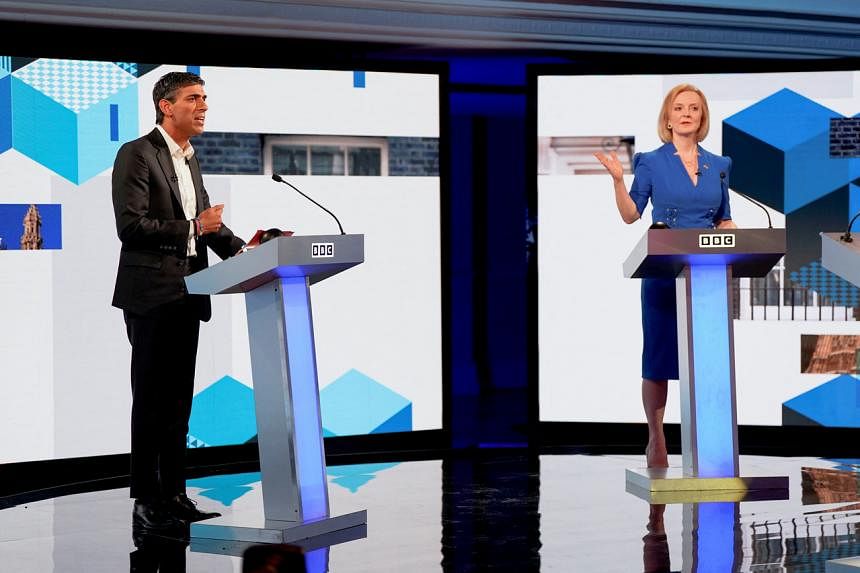LONDON (REUTERS) - The final two candidates in the race to succeed British Prime Minister Boris Johnson clashed on Monday (July 25) in a televised debate, during which they tore into each other's tax and spending plans.
Foreign Secretary Liz Truss, the bookmakers' favourite to win the Conservative Party leadership election, told former finance minister Rishi Sunak his emphasis on balancing the government's books would tip the economy into recession.
"Crashing the economy in order to pay a debt back quicker would be a massive mistake," Truss said.
Sunak, whose resignation from government earlier this month set in motion Johnson's downfall, said Truss's plan to cut taxes was nothing more than a "sugar rush" for the economy that would be followed by a crash.
The final stretch of a weeks-long contest has pit Sunak, a former Goldman Sachs banker who has raised the tax burden towards the highest level since the 1950s, against Truss, a convert to Brexit who has pledged to cut taxes and regulation.
Whoever triumphs when the result is announced on Sept 5 will inherit some of the most difficult conditions in Britain in decades.
Inflation is on course to hit 11 per cent annually, growth is stalling, industrial action is on the rise and the pound is near historic lows against the dollar.
Their quarrel on Monday underlined divisions in Britain's ruling party about the best way to manage the economy: Truss is pitching a continuation of Johnson's big-spending ethos, while Sunak is portraying the classic Conservative fiscal hawk.
"Does anyone think that the sensible thing to do is go on a massive borrowing spree worth tens of billions of pounds and fuel inflation even further?" asked Sunak, who repeatedly interrupted Truss.
Truss said she would challenge the economic orthodoxy of Britain's powerful finance ministry and dismissed Sunak's warnings about her plans as "project fear" - a line used by Brexit supporters during the 2016 referendum.
A snap opinion poll of 1,032 voters from Survation showed 39 per cent of the British public thought Sunak performed best during the debate, compared with 38 per cent who said Truss did.
Among Conservative voters, 47 per cent thought Truss did best, with 38 per cent for Sunak.
A YouGov survey of Conservative Party members published last week showed Truss held a 24-point lead over Sunak in the race to become leader.
The opposition Labour Party said both candidates had trashed the Conservatives' record in government during the debate, and that neither had offered a plan to tackle a worsening cost-of-living crunch.
Separately, Truss said she would bring in “tough and decisive action” to limit strike action by trade unions if she becomes Britain’s next prime minister.
In a week when rail unions are planning to strike over pay freezes and job cuts, Truss said she would introduce a new law in her first 30 days that would guarantee a minimum level of service on “vital national infrastructure” and also raise the minimum threshold for trade union strike votes.
“We need tough and decisive action to limit trade unions’ ability to paralyse our economy,” Truss said in a statement.
“I will do everything in my power to make sure that militant action from trade unions can no longer cripple the vital services that hard-working people rely on.”
Britain faces a summer of disruption as workers across the economy, struggling with a rising cost of living squeeze, resort to strike action in disputes over pay and conditions.
Rail workers brought services near to a standstill last month, British lawyers involved in criminal trials have staged walkouts, while teachers and doctors are threatening to strike.

